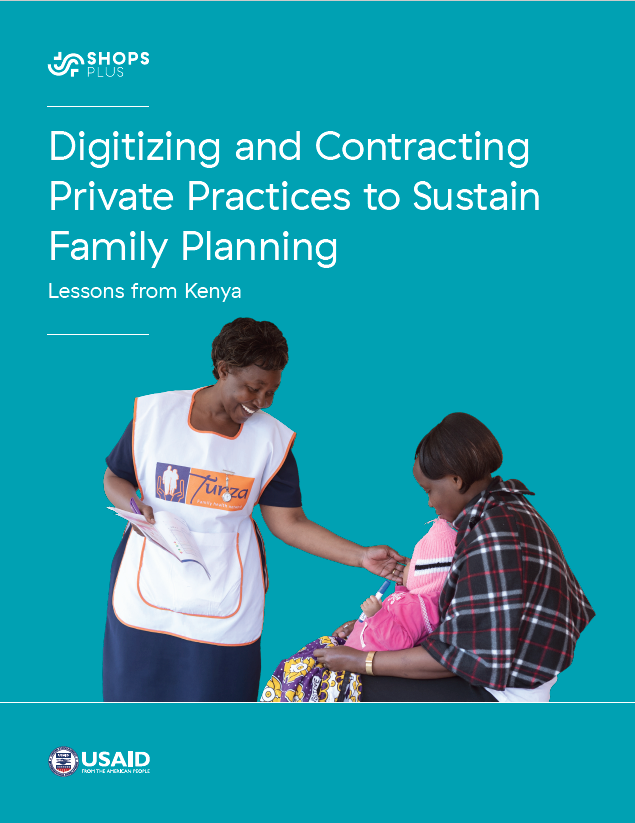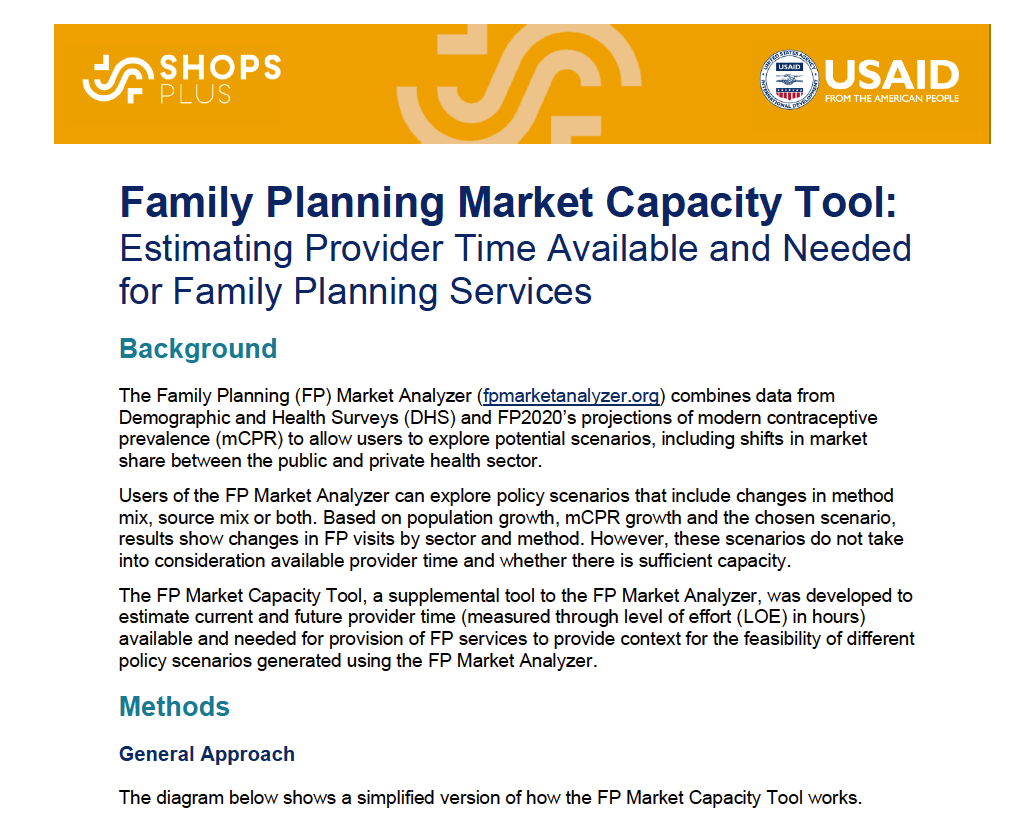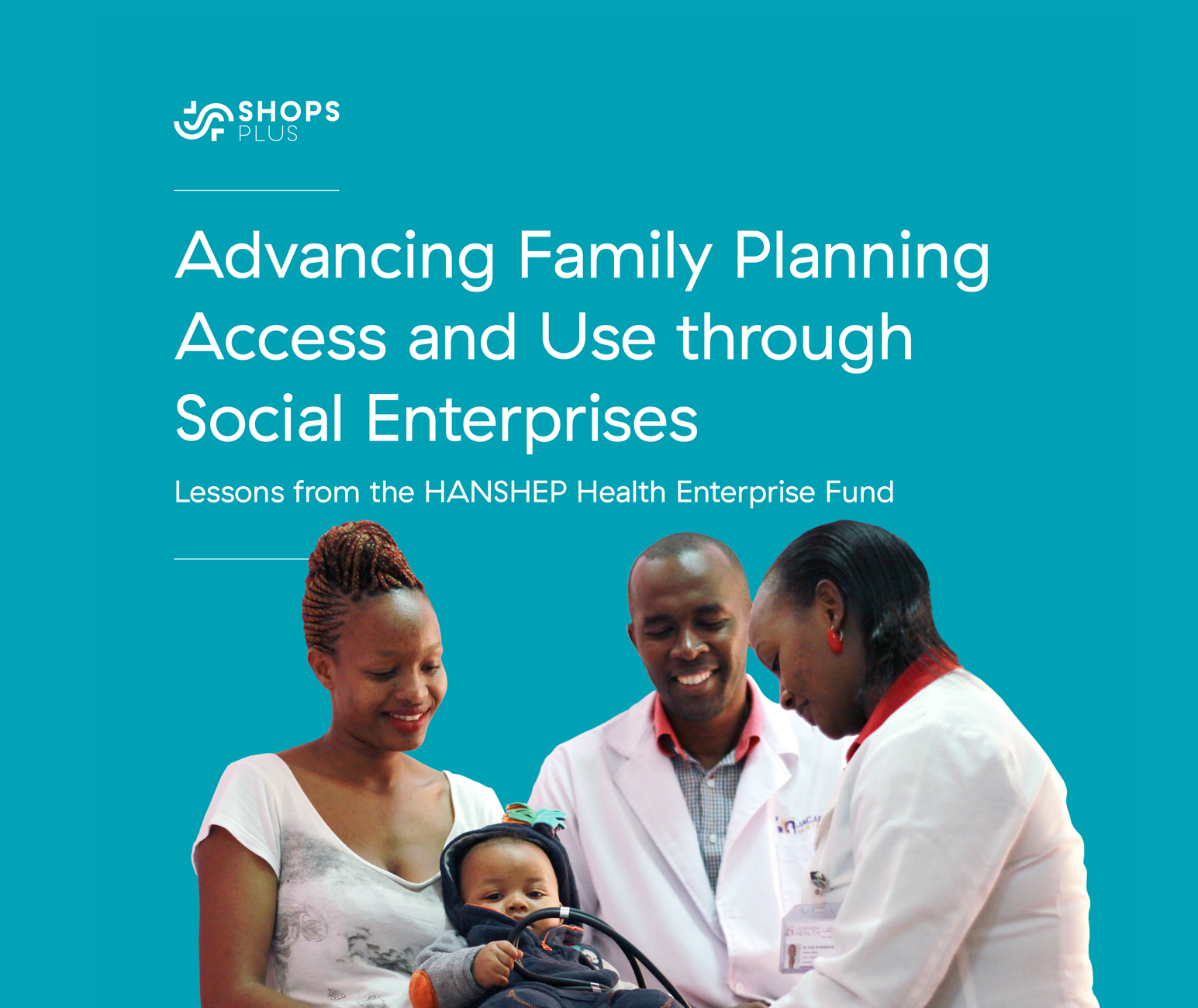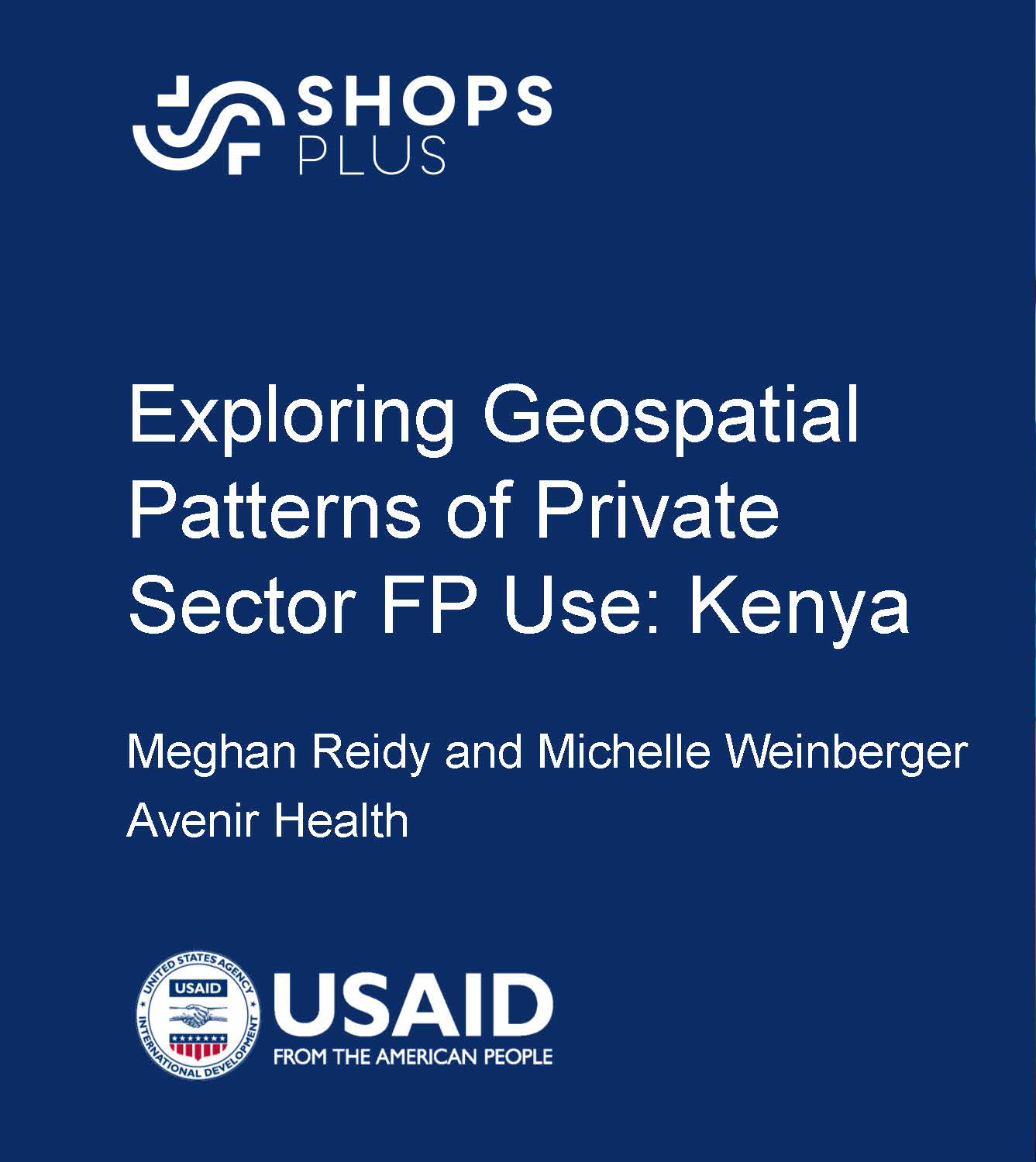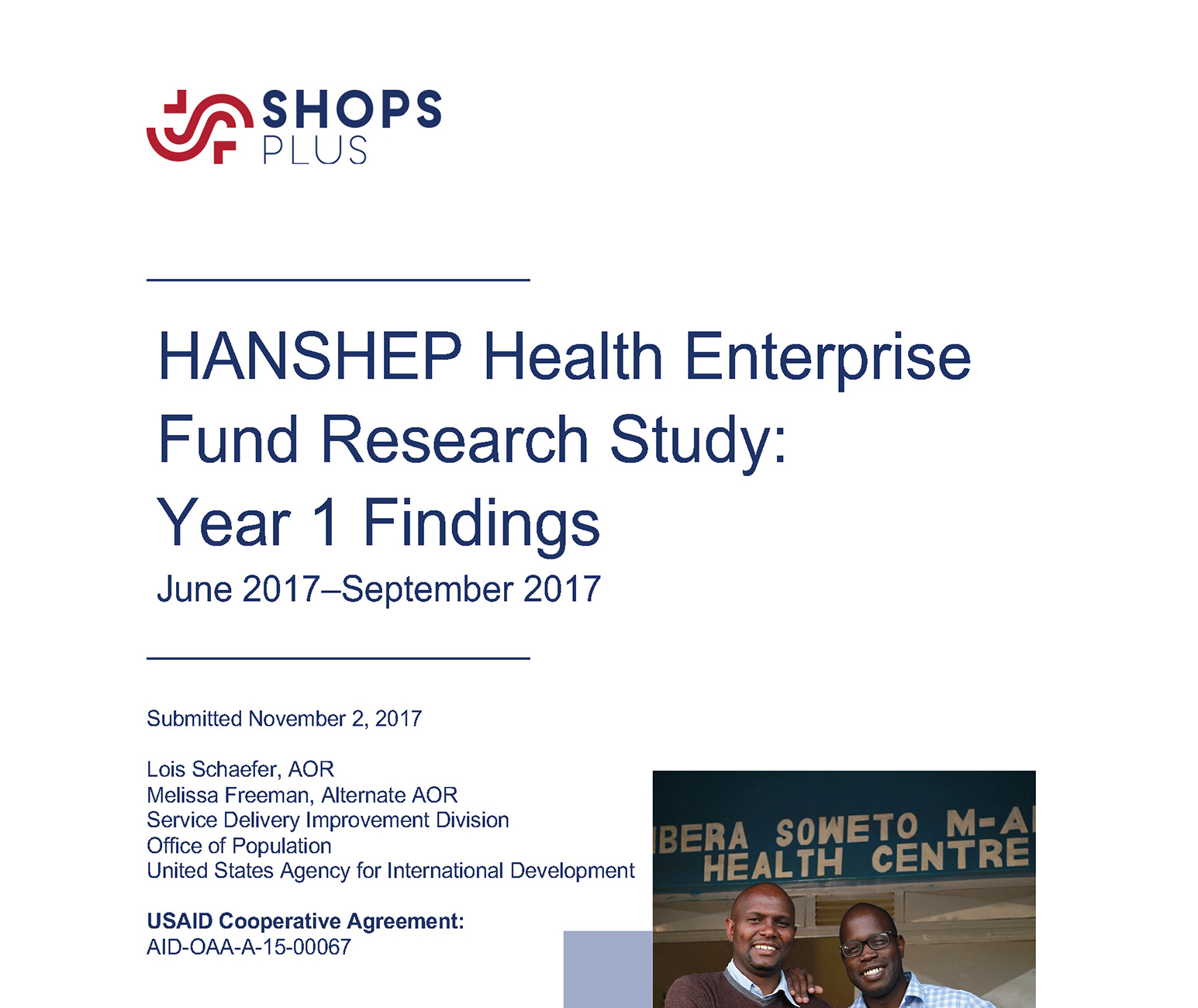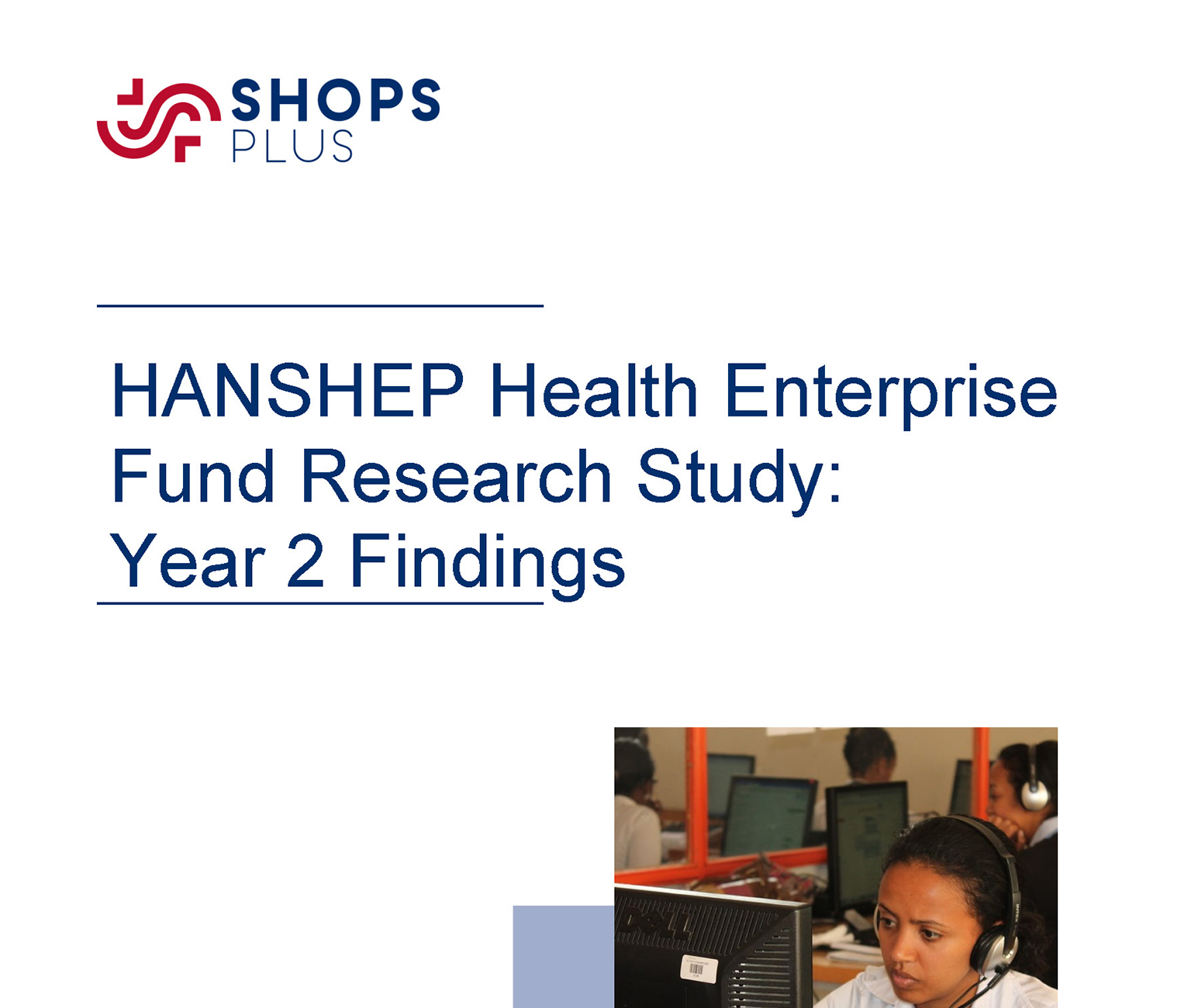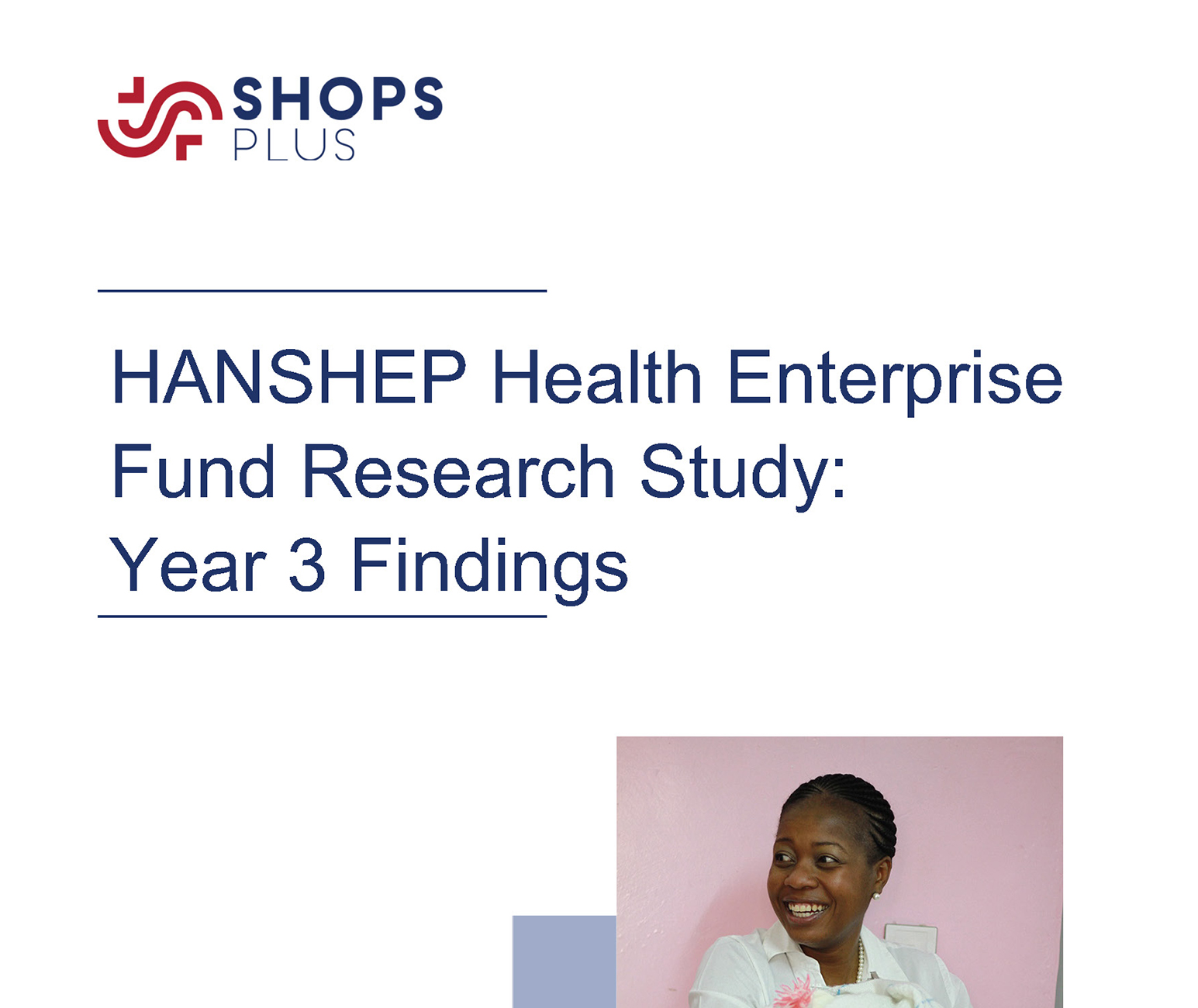
Resource Library
Investing in Women’s Health through Agricultural Supply Chains: Lessons from a Multi-Stakeholder Partnership led by Twinings Tea and USAID
In Kenya, the SHOPS Plus project helped USAID and Twinings develop and pilot a sustainable strategy to expand access to women’s health services on the farms from which Twinings sources tea. This brief describes the opportunity Twinings saw in investing in the health of women tea workers and the multi-stakeholder partnership model that the project piloted. It highlights key elements of the model that support sustainability and shares best practices that other brands and suppliers can replicate in their efforts to invest in the health of workers along their supply chains.
Resource Type :
Country : Kenya
Year : 2022-03-21T13:00:00
Language : English
Project :

Resource Library
Digitizing and Contracting Private Practices to Sustain Family Planning: Lessons from Kenya
Private providers in Kenya, including numerous small and medium practices, have the potential to attract and retain clients, increase revenues, operate more efficiently, and contribute to universal health coverage by digitizing operations and participating in health financing programs. Both actions aim to sustain scaled-up provision of health services, including family planning, in the private health sector while reducing financial barriers for clients. This brief focuses on the transition from paper, cash-based operations and limited individual contracts with payers, to digital solutions that enable more efficient contracts between multiple providers and payers. The Sustaining Health Outcomes through the Private Sector Plus project examined effects from two reinforcing interventions in which an intermediary supported a network of 33 practices to (1) install and build use of a digital clinic management system, and (2) contract with health financing programs such as the National Hospital Insurance Fund (NHIF), individually and as a network. The COVID-19 pandemic affected implementation of both interventions, as did learning that the NHIF requires legal reform before it can contract with an intermediary that represents multiple private providers. The intermediary succeeded in contracting the network with a private health insurance scheme for low-income households, and digitized the clinical and administrative operations of 10 new network members. Looking ahead, donors can support governments, in collaboration with private stakeholders, to enact reforms that enable contracting between programs like the NHIF with intermediaries representing multiple practices. Donors can also assist intermediaries to develop and deliver a sustainable value proposition. Done right, these efforts can enable private practices, especially smaller ones, to sustainably increase access to family planning and other essential health services.
Resource Type : Brief
Country : Kenya
Year : 2021-10-19T15:00:00
Language : English
Project : SHOPS Plus

Resource Library
Family Planning Market Capacity Tool: Estimating Provider Time Available and Needed for Family Planning Services
The Family Planning (FP) Market Analyzer (fpmarketanalyzer.org) combines data from Demographic and Health Surveys (DHS) and FP2020’s projections of modern contraceptive prevalence (mCPR) to allow users to explore potential scenarios, including shifts in market share between the public and private health sector. Users of the FP Market Analyzer can explore policy scenarios that include changes in method mix, source mix or both. Based on population growth, mCPR growth and the chosen scenario, results show changes in FP visits by sector and method. However, these scenarios do not take into consideration available provider time and whether there is sufficient capacity.
The Family Planning Market Capacity Tool was developed to estimate current and future provider time (measured though level of effort (LOE) in hours) needed for provision of family planning services to provide context for the feasibility of different shifts in method mix and market share between the public and private health sector. The FP Market Capacity Tool should be seen as a starting place for conversations about what the current health infrastructure looks like within a country, and how that relates to the potential feasibility of different future scale up plans. In addition, other considerations need to be taken into account beyond simply the availability of provider time, including training and quality assurance, client and provider preferences, and the affordability of services, especially within the private sector.
This tool has been pre-populated with data for 7 countries for which sufficient data on health care infrastructure in both the public and private sector could be found: Bangladesh, DRC, Haiti, Kenya, Malawi, Nepal, and Senegal.
Resource Type : Brief
Country : Bangladesh, Democratic Republic of Congo, Haiti, Kenya, Malawi, Nepal, Senegal
Year : 2021-09-28T15:00:00
Language : English
Project :

Resource Library
Advancing Family Planning Access and Use through Social Enterprises: Lessons from the HANSHEP Health Enterprise Fund
SHOPS Plus project conducted a longitudinal study with 3 of the 16 grantees of the HANSHEP Health Enterprise Fund, a challenge fund that identified and supported private sector solutions to address family planning and other health priorities in sub-Saharan Africa under the SHOPS project from 2013 to 2015. The study examined how grantees have increased access to family planning products and services since the end of the fund, and its findings document the value of investing in private sector social enterprises as a means of increasing access to family planning. Selected for their provision of family planning along with other primary health care services, these enterprises demonstrate how private sector engagement and social enterprise investment can deliver on family planning goals. This report focuses on two organizations in Kenya—Afya Research Africa and Jacaranda Health—particularly on how they have increased access and use of family planning via their broader business models. The two organizations provide excellent case studies for how to support social enterprises. Also included are observations on a third enterprise, Telemed Medical Services, in Ethiopia, which withdrew from the study. The report documents lessons to inform future partnerships and investment in social enterprises. It also advances the business case for investing in such enterprises to increase family planning access, and shares lessons on how the United States Agency for International Development and its partners can support enterprises in achieving sustainability and scale.
Resource Type : Report
Country : Ethiopia, Kenya
Year : 2021-09-21T06:46:00
Language : English
Project : SHOPS Plus

Resource Library
Exploring Geospatial Patterns of Private Sector FP Use: Kenya
Existing tools allow for exploration of patterns of public and private sector contraceptive use segmented by key demographics such as age, marital status, or urban/rural residence. While useful to understand differentials in the use of the public and private sector, these approaches do not provide a view into geographic differences across a country. Utilizing an approach known as small area estimation, SHOPS Plus has developed a series of "heat maps" for five countries that explore how contraceptive use and use of the public and private sectors varies across a country. Maps provide both relative views (e.g., the share of women using the private sector) and absolute views (e.g., the number of women using the private sector) as both can be useful for different advocacy and planning needs. Maps also overlay useful contextual information such as the location of cities, towns, roadways and health facilities. The five countries covered by this work are: Guinea*, Kenya, Nepal, Uganda, and Tanzania.
*Guinea analysis also includes select Child Health indicators
Resource Type : Presentation
Country : Kenya
Year : 2021-09-02T14:30:00
Language : English
Project : SHOPS Plus

Resource Library

EOP series: Accelerating private sector engagement: What the future holds
During this webinar, the last in the end-of-project series, leaders from the project reflected on results and implications. With special guests from USAID, FP2030, and the David and Lucile Packard Foundation exploring what the future holds. Susan Mitchell, project director for SHOPS Plus, opens the webinar with an overview of the projects acheivements.
Since 2015, SHOPS Plus has sought to harness the full potential of the private sector and catalyze public-private engagement to improve health outcomes and increase access to family planning, HIV/AIDS, maternal and child health, and other priority health services.
Moderator:
- Caroline Quijada, Deputy Project Director, SHOPS Plus, Abt Associates
Speakers:
- Mbogo Bunyi, Senior Private Sector Advisor, SHOPS Plus, Abt Associates
- Ramakrishnan Ganesan, Senior Private Sector Advisor, SHOPS Plus, Abt Associates
- Jeanna Holtz, Health Financing Director, SHOPS Plus, Abt Associates
- Emily Mangone, Digital Health Specialist, SHOPS Plus Abt Associates
- Michelle Weinberger, Modeling and Segmentation Advisor, SHOPS Plus, Avenir Health
Guest speakers:
- Chonghee Hwang, Director, Country Engagement and Transition (Africa and Asia), FP2030
- Kuyosh Kadirov, Senior Private Sector Advisor, U.S. Agency for International Development
- Anand Sinha, Country Advisor, India, the David and Lucile Packard Foundation
Resource Type : Webinar
Country : India, Madagascar, Nepal, Senegal, Tanzania
Year : 2021-07-20T13:00:00
Language : English
Project :

Resource Library
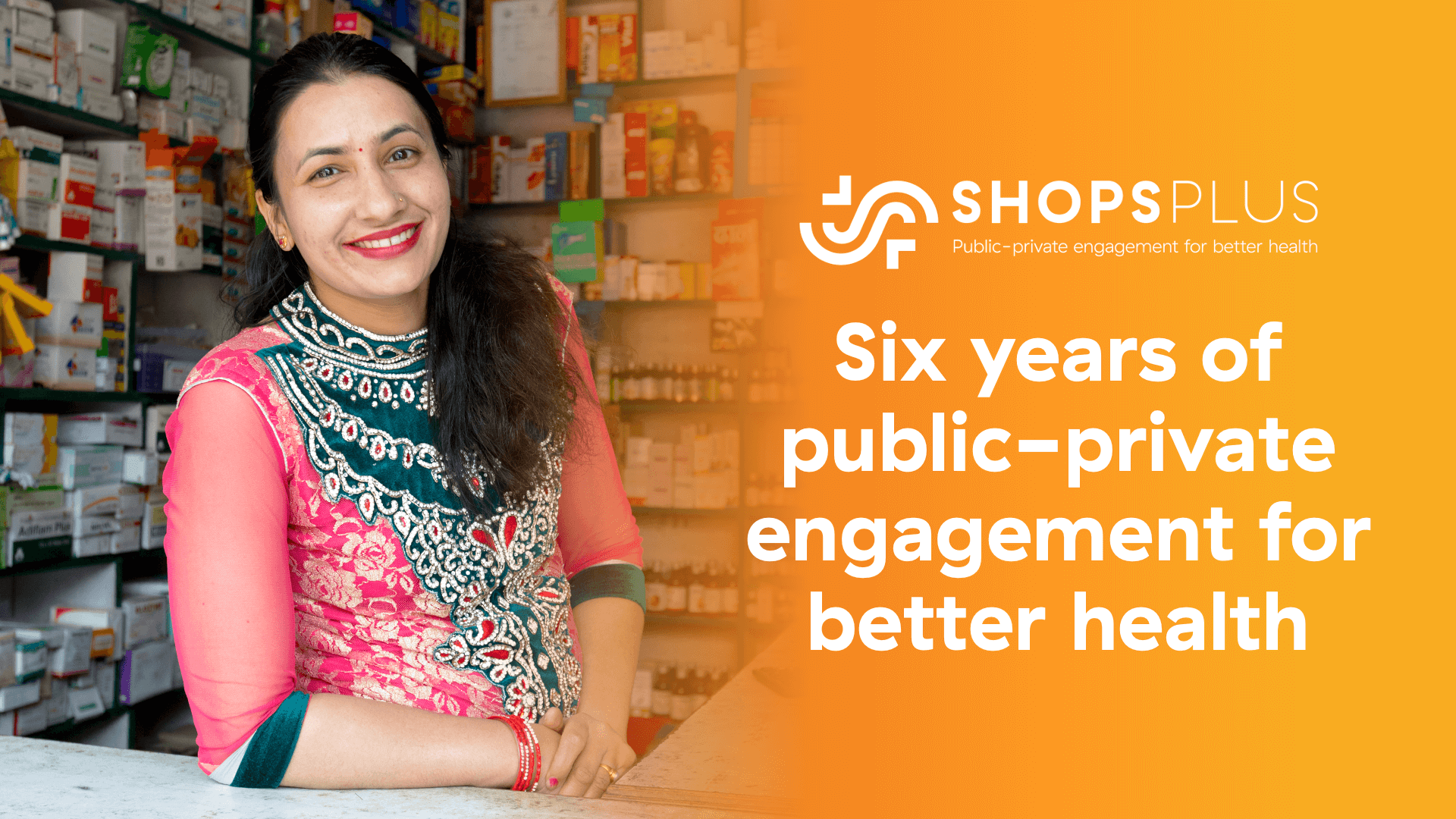
Video: Highlights from SHOPS Plus - Six years of public-private engagement for better health
Watch highlights from six years of SHOPS Plus engaging the private sector in health.
The video was shown July 14, 2021, during the webinar “Accelerating private sector engagement: What the future holds.”
Resource Type : Video
Country : India, Kenya, Madagascar, Nepal, Nigeria, Rwanda, Senegal, Tanzania
Year : 2021-07-15T12:30:00
Language : English
Project :

Resource Library
HANSHEP Health Enterprise Fund Research Study: Year 1 Findings
The HANSHEP Health Enterprise Fund (HHEF) was implemented as part of the Strengthening Health Outcomes through the Private Sector (SHOPS) project from January 2013–June 2015. The HHEF selected enterprises and provided them with grant funding and technical assistance to increase the financial, knowledge, human, and social capital of the grantees to facilitate their transition to scale. This study examines three HHEF grantees and evaluates how they have increased access to family planning products and services since the end of the project. In addition, the study explores the technical and managerial capacities that were important for enterprise performance as well as the role that the HHEF interventions played in developing those capacities. The study finds that future interventions like the HHEF should consider framing development challenges in terms of market shortcomings, or root causes, which may lead to more effective solutions and greater opportunities for sustainable and scalable enterprise models that address them. In addition, future interventions should more intentionally consider the effect that the structure of the program itself have on enterprise behavior and outcomes.
Resource Type : Report
Country : Ethiopia, Kenya
Year : 2017-11-30T04:00:00
Language : English
Project : SHOPS Plus

Resource Library
HANSHEP Health Enterprise Fund Research Study: Year 2 Findings
The HANSHEP Health Enterprise Fund (HHEF) was implemented as part of the Strengthening Health Outcomes through the Private Sector (SHOPS) project from January 2013–June 2015. The HHEF selected enterprises and provided them with grant funding and technical assistance to increase the financial, knowledge, human, and social capital of the grantees to facilitate their transition to scale. This report details the findings from Year Two of a longitudinal research study of three HHEF enterprises. Year Two of the study examined how enterprises integrate family planning into their business models, the contributions that family planning has made to the enterprises’ strategy and performance, and the contribution that the HHEF made to participating enterprises’ development. The research identified three distinct effects that the HHEF support had on the enterprises—catalytic, broad, and focused. The research identified operational challenges of integrating family planning into enterprise business models and explored the revenue and non-revenue benefits to the enterprises of providing access to these services. Findings can help make the business case for greater private sector provision of family planning and provide guidance to help enterprises overcome the operational barriers they face in adding family planning to their business value proposition.
Resource Type : Report
Country : Ethiopia, Kenya
Year : 2018-11-30T12:00:00
Language : English
Project : SHOPS Plus

Resource Library
HANSHEP Health Enterprise Fund Research Study: Year 3 Findings
The HANSHEP Health Enterprise Fund (HHEF) was implemented as part of the Strengthening Health Outcomes through the Private Sector (SHOPS) project from January 2013–June 2015. The HHEF selected enterprises and provided them with grant funding and technical assistance to increase the financial, knowledge, human, and social capital of the grantees to facilitate their transition to scale. This report details the findings from Year Three of a longitudinal research study of three HHEF enterprises. Year Three of the study identified how enterprises implement quality assurance and improvement standards and how HHEF investments contributed to increases in availability of quality services. The study finds that the enterprises do apply robust quality assurance standards, which have an associated cost. Enterprises are motivated to comply with quality standards, in part, to differentiate themselves from their competitors.
Resource Type : Report
Country : Ethiopia, Kenya
Year : 2019-11-29T12:00:00
Language : English
Project : SHOPS Plus
Pagination
- Previous page
- Page 2
- Next page



